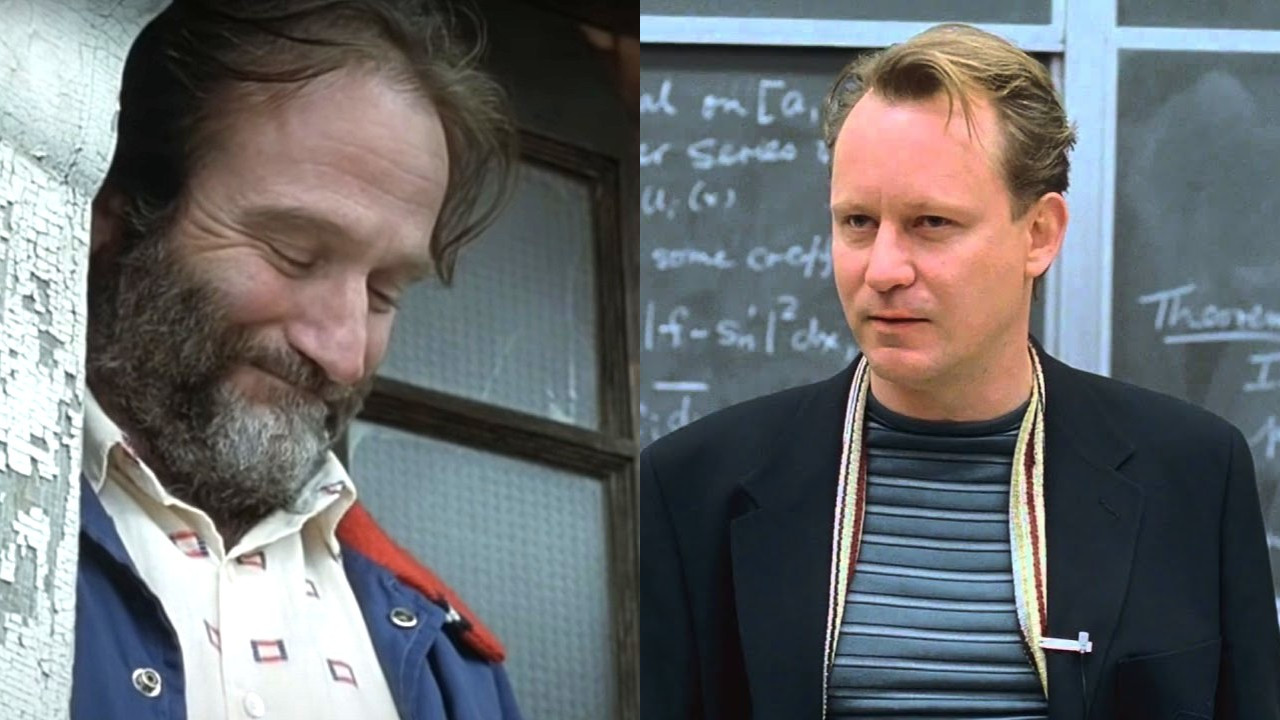Interview: Armed With A Flamethrower And A Camera, Bellflower's Evan Glodell Breaks Out
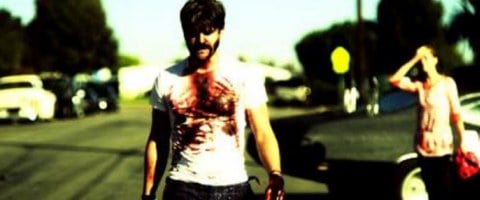
Your Daily Blend of Entertainment News
You are now subscribed
Your newsletter sign-up was successful
Parked somewhere on the Comic Con-clogged streets of San Diego was Mother Medusa, a jet-black, fire-breathing 1972 Buick Skylark that Evan Glodell had driven down there from L.A. The car is the centerpiece of both the underground marketing campaign for Glodell's film, Bellflower, and the movie itself, a made-on-a-shoe-string, violent and challenging Sundance success that's pretty much the opposite of the corporate blockbusters usually trotted out at Comic Con. When I talked to Glodell in Manhattan a few days before the Con, he didn't seem entirely certain why he was headed there, but he and much of his production team were game anyway, doing interviews and holding forth at a happy hour scheduled directly opposite the massive panel for The Amazing Spider-Man.
Bellflower isn't taking on big Hollywood quite as literally as that scheduling conflict would suggest-- it's a small movie, distributed by tiny Oscilloscope Pictures, and is as likely to alienate audiences with its twisted humor and violence as it is to delight them. The formula here is much closer to that of your usual festival success, Sundance buzz translating into a splashy SXSW spot (complete with demonstrations of Mother Medusa's flame shooters and a cricket eating contest) which led to Glodell's grueling national tour, driving the clanky old car up and down the East Coast to bring Bellflower to a series of festivals. He's done about 50 post-screening Q&As, admitting he gets super nervous before all of them, and when I saw him at a rooftop party at Comic Con his voice was a hoarse whisper, with plenty more interviews to go the next day. (Bizarrely, I had also lost my voice, and we were forced to conclude that one of us had gotten the other sick over the course of our 40-minute interview-- a definite first for my professional career).
Glodell wrote the script for Bellflower close to a decade ago in a post-breakup rage; he directed the film and stars in it, edited it on a laptop that frequently crashed, and built a special camera rig for a single, climactic shot near the end of the movie. But when he talks about Bellflower, he frequently refers to "we," meaning the people who play the other major characters in the movie and stuck by him on the three-year odyssey of shooting and getting into into Sundance, a goal Glodell says was unimaginable-- "We never thought we would be in that class." On that same San Diego rooftop I chatted with Vincent Grashaw, who introduced himself as he movie's producer before I realized he also played a key character (who's involved in an extremely graphic sex scene to boot). Grashaw wasn't drinking that night-- someone had to drive the Medusa back to the hotel. Not far away at the party was Tyler Dawson, who with Glodell makes up the film's central duo of Aiden and Woodrow, best friends since childhood who built Medusa and a flamethrower themselves, and constantly plan for how they'll survive the apocalypse. Filling out the quintet are Jesse Wiseman as Milly, the girl Glodell's Woodrow falls hard for, and Rebekah Brandes, a girl Aiden has a crush on but who gets tangled into their lives in a much more complicated way when Woodrow and Milly's relationship falls apart.
It's easy to compare these guys to their onscreen counterparts, a group of hard-drinking, violence-prone men and women who don't appear to work real jobs or think much about the future-- even as Grashaw was telling me about his background as a boxer, he admitted he's sick of the assumption. But the amount of work Glodell and company have put into getting Bellflower out there, and the clear-eyed view the movie has of a young man's anger and desperation, is why it's already a success, the movie at festivals that people can't stop talking about, a powerful and personal debut that automatically makes Glodell a director to watch. It's a movie about the self-centeredness and arrogance of young men, but made by a young man who has learned, through an incredible amount of work and passion, to be better. Glodell says he's got a script finished for what he plans as his next film, and not only can he not yet imagine directing anyone else's work, he has no plans to move over into the big, lucrative side of filmmaking-- "I don't care if it leaves me homeless living under a bridge, that seems so wrong to me." Take that, Amazing Spider-Man.
My very long, but hopefully very worthwhile, interview with Evan is below. For more on the movie and to find out where it's playing near you, go here. The movie opens this Friday in New York and LA and expands across the country from there.

Do you feel like you have to prepare people for the movie before they see it?
I actually don't know. I used to. But now, because we have a trailer and a poster, and the trailer and poster both seem pretty intense. I feel like I have to warn people the opposite way. Well, they're at least going into it thinking it's not going to be just a love story. For a while I was telling people, "You know, this doesn't take place in the apocalypse, and it's a love story and takes place in the real world." It seems like people still like it not knowing when they got in.
Your Daily Blend of Entertainment News
Do you consider yourself an actor? Had you acted before?
Not really. I've acted in weird projects of my own and my friends. I don't have any ambitions to be an actor. I really hope that i don't end up somehow tricking myself into playing a part in my next movie. I don't think that's a good idea.
Why was it a good idea for this?
Because it was so personal. I knew that I wasn't experienced enough when we started this project-- the best actors are going to be very hard to find and get them to come work with you. Even if you've got one, I wasn't experienced enough to get the performance. Which I think I'd be ready for now. I had to deal with all the other actors and had to go through the three-year process of making the movie. You may know things about this movie that are super important to you that you don't even consciously realize yet, and if you put yourself into the movie, it's very likely that some of that stuff is going to come out.
You obviously know this world really well, people working shitty jobs and drinking too much. And that's so different from the posh film school path so many people take. When did film come in for you?
That was supposed to be a snapshot of what life was like in my early 20s. I was always making movies-- not always, but when I was 18 I decided I wanted to move out to LA, because that's where movies get made, right? Then it took me until I was 20, almost 21 to get my shit together and get out there. Once I got out there I was like, holy crap, I can tell right away I'm not going to fit in with this structure. I moved to the LA area and started talking to people and stuff and thought, I'm not going to get into this. There's no job for me here.
So you didn't try to be PA?
I think as much as you can try. I tried to get little jobs like that. I'm a very strange person, I don't know. I wouldn't hire me on my set. I don't even think I'm organized enough. So I just started making short films. I moved all the way out to California to make short films, with my brother who moved with me, on a camcorder with inexperienced actors. From the time I was about 20 that's what I was doing.
What's the time between that and when you started making this?
In late 2007 we started pushing, like we're going to make this happen. It was summer of 2008 that we started shooting. That would have been almost 8 years.
And you wrote the script a while ago.
I wrote the script at the end of 2003, roughly.
And you wrote it in the wake of a breakup in a really angry space. When you write something like that and then spend all that time making it, how do you not start feeling like it's terrible at some point, and stick with that anger that's such a huge part of this?
I don't think the movie is silly now, I'm happy with it. It's done, it's going to be in the world. But me, I hit that point very recently, where it's hard to talk about this shit, because I moved past it. I spent 6, 7 years thinking about it and working on it and trying to get this movie to happen, then finishing it, and now it's like, I'm ready to move on. But people are curious because they like the movie.
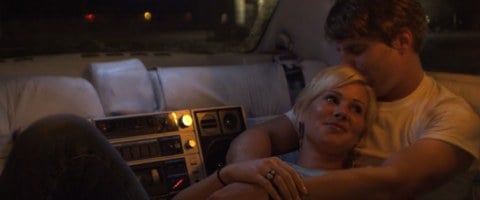
Was it hard to play that when you were filming?
It was sometimes, but… I don't think it was any harder than I thought it was going to be.
What was harder than you thought it would be?
Finishing the movie. Everything was harder than I thought it was going to be. You may have asked the one thing that wasn't hard. I was always scared about acting in the scenes. Most days came and in morning it would be "shit, we're actually going to do this today?" This will be the day that everybody on the team realizes they made a mistake. I think I got there enough. But I always knew that would be hard. It was the rest of the stuff that also was hard that I didn't know was going to be hard. I knew it was going to be an unbelievably large project, the biggest project I had ever taken on in my life, but even then I didn't see how hard it was going to be to even get all the shots, shoot all the shots. How hard it was going to be to be happy with the cut. How hard it was going to be even when we were done to get anybody to even care enough to watch it, get one person to watch it and want to help us. And then how hard it was going to be to get that crazy movie we spent so many years on and get it out into the world legally.
Legally? Because of the Mad Max stuff?
That's part of it. And then, half the music is original, and half of the music is stuff that had been there. Since our movie was bought, it was this huge separate battle of begging, trying to find people who knew people to explain to them. Anybody who was even remotely big, you didn't even get to the band. The label or the publisher would just be like, "No, sorry. Don't call again."
Obviously music rights are something that everybody runs into. Did you think about it when you were making it, or was the idea just so far away?
The idea was just so far away. I was just trying to make the movie the best it could be, and there were never any rules or limitations on that. I had never been through it before.
So when you get to Sundance and a lot of people are watching it, what's that like for you?
It was the scariest thing ever before the first screening. [Producer and co-editor] Joel [Hodge] has footage of us driving up to the first screening at Sundance, and I don't even know what the word is, it looks like we're getting ready to go into war. I was like, imagine if people don't like the first half of the movie, or the switch in the middle where the tone changes. All of a sudden when it gets to the really crazy violent stuff in this one section, then they're going to be like, "Screw you, you suck, we hate you." In my mind that was a possible, real outcome.
You knew you had a movie that could be polarizing.
Oh, totally. But I'm just saying as an overall reaction. To see that at the first screening went so well. The whole dream that we had been working toward all came true in that one week. We got into a festival, we got into Sundance, we never even though we would go to Sundance. Once, maybe Vince had said it-- no, Vince never even said it. We never thought we would be in that class. So that happened, we got recognition, people said the movie was good. Then the movie sold and then reviews came out. I had never read reviews before, and that was a trip. The first review that came out, I freaked out. It was a good review, but it wasn't a super positive review. It said one or two negative things, and I wasn't used to that, so I freaked out. [Now] I think all the reviews are awesome. We don't get bad ones very often, but most of the time I can agree with the bad ones. But it takes a little while to get there. At first when you read a bad review it crushes you.
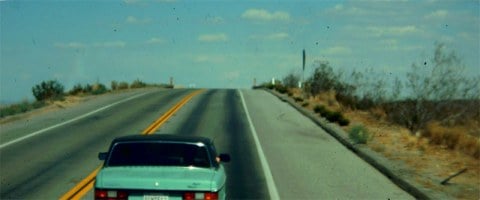
Then you get to SXSW and there's a cricket eating contest and the car driving around, what's that like?
Those are things we did fantasize about. When the Medusa car became such a challenge to keep running--half the time what I was doing was figuring out how to keep the Medusa car running. At this point it's been so many things, because it's an old car and we beat on it, and eventually everything is going to break. It was like, fuck, this car is breaking, and we never even got the pleasure of driving it around the neighborhood. Me and Joel talked about it a lot-- "I wonder if somehow when our movie comes out if it does well, we'll be able to go in a road trip with the car because of it." We had settled on that being all we wanted. And we got to do that. LA to Austin and back, then shipped to the East Coast driven up and down to festivals. About every week we get stuck in the parking lot of an auto parts store for a day.
Expecting to go to Sundance is something a producer would have told you was possible, if you'd had an experienced person like that. Do you think you had an advantage not having any rules and coming from outside?
I hope so. Every time I hear someone say they're making a movie to get into Sundance it makes me cringe. I'm like, if you're really making a movie, and you really care about the movie you're making, you shouldn't be thinking about where it's going to go. Obviously I've seen on a million websites, tips on how to make sure your movie sells, and first thing-- you can't make your movie without first thinking business. I will never do that. I don't care if it leaves me homeless living under a bridge, that seems so wrong to me. It seems like it's against the entire reason we have movies. If you have an idea, whatever you think is exciting or cool, that's going to be personal to the writer or director or both, the best movie you can make is the one that's thought of from that place. I want to make this, because this is a movie that I want to see, whatever it is. That's got to be where the bad movies come from.
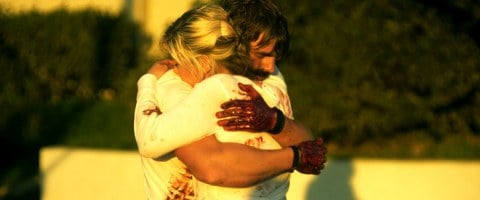
Presumably you have people who are now interested in helping you make your movies and providing outside money. Does that change what you're able to imagine for yourself next?
Yeah, I hope so. I hope I can deal with that. It worries me a little bit. Even from what I know right now, I would certainly take less money over more money if it meant there was going to be less involvement from somebody else.
Do you think this is the most personal movie you'll wind up making?
Maybe.
Do you hope it's the most personal movie you'll ever make?
I don't know. I have an idea for a movie that is so insane it's sort of a joke, but I thought man, if I ever really did that, that would definitely be the most personal movie I ever made. But it's really crazy.
Crazier than this?
Infinitely so.
Staff Writer at CinemaBlend

